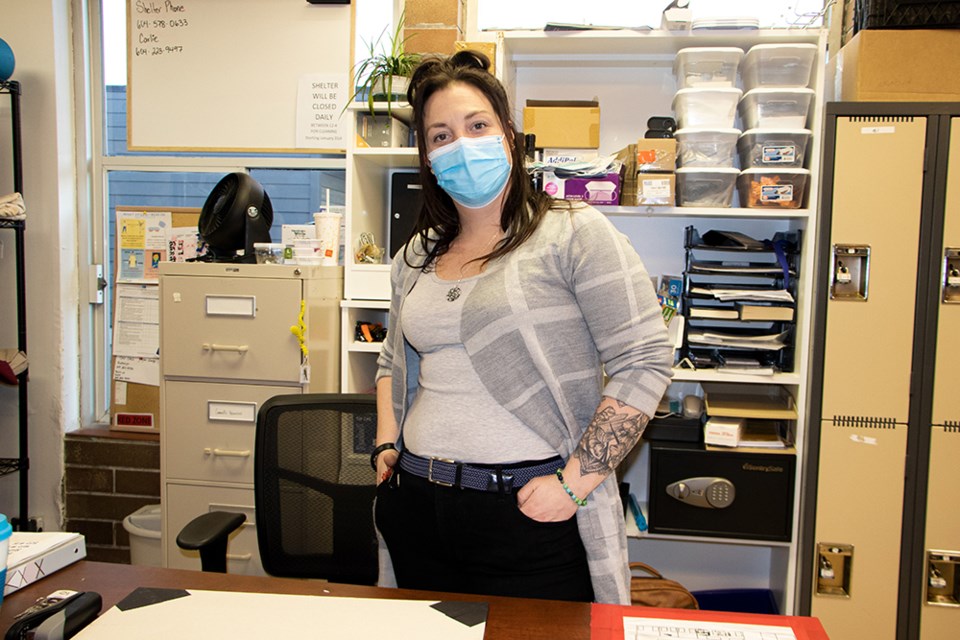An emergency winter shelter with 20 beds opened on January 10 for individuals without housing, which coincided with the closing of a program offering temporary housing at the Westview Centre Motel.
Inside the shelter is a small reception area beside an open space with couches, tables, stocked bookshelves, a television and lockers for residents to store their personal items securely. Adjacent to reception is a “free store” with different clothing and other textile items for residents to claim as needed.
Beyond that is a kitchen and a hallway to the sleeping quarters, including several rooms with two or more beds in each. Clothing and other personal belongings are on beds and hung up on walls.
Carlie Tarlier started with Lift Community Services, which operates the facility, two years ago as a support worker. Two years later, she said the residents and staff are like a family.
“We do movie nights, we play games,” said Tarlier. “We really try to acknowledge that there’s COVID in the community, but at the same time, it’s hard, right?”
The residents are offered breakfast and dinner in the shelter, cooked by members of a youth-at-risk program through Lift.
“It’s kind of that collaborative effort to fill the gaps that are needed,” added Tarlier.
BC Housing covers housing and food costs for the winter shelter. The project is funded until their fiscal year-end on March 31. Additionally, City of Powell River Council voted unanimously to allow a temporary use permit for the new location on Joyce Avenue for up to three years before reapplying for a new permit is required.
With these temporary measures in place, the largest problem facing the housing situation in the qathet region isn’t necessarily funding, according to Tarlier.
“You’re hard-pressed to find an agency that’s going to run it; you’re hard-pressed to find staff who are going to work it,” said Tarlier. “BC Housing steps up when they need to, they really do. But there also has to be buy-in from the community and buy-in from council members. There has to be land and an agency that’s going to sign on to that contract.”
To make matters worse, Tarlier said the previously quoted estimate of 100 people on the brink of homelessness in the region is likely a very low ballpark figure.
She said she receives calls from new people all the time, people who are couch surfing or temporarily staying with family members. She calls this hidden homelessness.
Shelter stays
Dynamics within the shelter are interesting, as most residents in this small rural community know each other and have a history.
“A lot of these folks have had experiences with each other,” noted Tarlier. “But it’s like, it’s a new day, it’s a new stay.”
She emphasizes the shelter’s respect protocol.
“If you have a beef with somebody, leave it at the door. Keep each other safe, even if you don’t like each other. We’re all trying to just coexist.”
Tarlier said her goal for the shelter is to create a low barrier, shelter setting that is community-oriented.
“If you say you’re homeless, you have a place to stay,” she added, “as long as we have beds available.”
Current resident
Josh, a current resident of the shelter, is young and kind of shy. He had to transfer from the Westview Centre Motel when the program ended.
“It’s hard going from having your own space and shrinking everything down to coming into a group place,” he said.
Josh has been living without stable housing for three years, and before the motel, he lived in a tent. He said he would be back to living in a tent if there was no emergency shelter.
“Living on the street is horrible,” he added.
Although the shelter is not an ideal solution, it keeps Josh dry and warm, and provides him with a baseline so he can focus on his steps forward.
First time
Another resident, Gary, sat on the couch in the main area, reading a book. He wore glasses and what seemed like a big smile under his mask.
Gary had been at the shelter for about a week. He said he has lived in qathet region for 15 years, and this is his first and only time staying in a shelter.
His last rental was recently shut down due to poor conditions. Before that, he lost his job at a local restaurant when it closed.
Despite his challenges, Gary keeps going. During the day, when the shelter closes for cleaning between noon and four, he heads out to drop off resumes.
“Nothing personal, but the sooner I get out of here, the better,” said Gary. “It doesn’t fit into my plans. My plans are to get a place and get a job.”
He hopes his childhood sweetheart will join him here full-time this summer. A new job and his old age security, which is due to start in August, should be just enough for them to rent a small two-bedroom apartment in town.
Future plans
Tarlier said the future of the winter shelter is more about looking at sustainable and affordable housing for all members of the region, beyond an emergency shelter. She hopes more low-income housing will be coming soon.
“I can’t speak about what it’s like to be homeless,” she added. “I have a warm, dry, nice home to go home to at night. I have no understanding of what it’s like to be homeless or even at risk for homelessness.”


